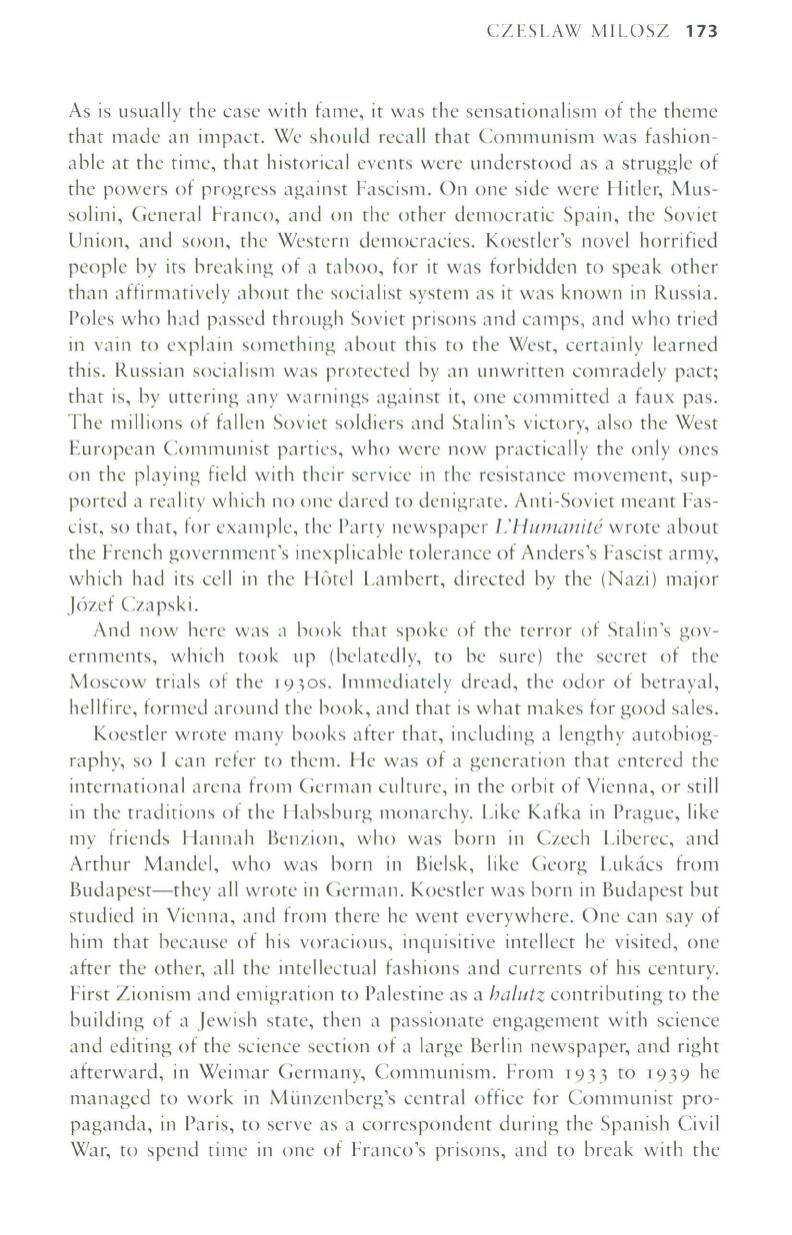
CZESLAW MILOSZ
173
As is usually the case with fame, it was the sensationalism of the theme
that made an impact. We should recall that Communism was fashion–
able at the time, that historical events were understood as a struggle of
the powers of progress against Fascism. On one side were Hitler, Mus–
solini, General Franco, and on the other democratic Spain, the Soviet
Union, and soon, the Western democracies. Koestler's novel horrified
people by its breaking of a taboo, for it was forbidden to speak other
than affirmatively about the socialist system as it was known in Russia.
Poles who had passed through Soviet prisons and camps, and who tried
in vain
to
explain something about this to the West, certainly learned
this. Russian socialism was protected by an unwritten comradely pact;
that is, by uttering any warnings against it, one committed a faux pas.
The millions of fallen Soviet soldiers and Stalin's victory, also the West
European Communist parties, who were now practically the only ones
on the playing field with their service in the resistance movement, sup–
ported a reality which no one dared
to
denigrate. Anti-Soviet meant Fas–
cist, so that, for example, the Party newspaper
L'Humanite
wrote about
the French government's inexplicable tolerance of Anders's Fascist army,
which had its cell in the H()tel Lambert, directed by the (Nazi) major
J6zef Czapski.
And now here was a book that spoke of the terror of Stalin's gov–
ernments, which took up (belatedly, to be sure) the secret of the
Moscow trials of the
19305.
Immediately dread, the odor of betrayal,
hellfire, formed around the book, and that is what makes for good sales.
Koestler wrote many books after that, including a lengthy autobiog–
raphy, so I can refer
to
them. He was of a generation that entered the
international arena from German culture, in the orbit of Vienna, or still
in the traditions of the Habsburg monarchy. Like Kafka in Prague, like
my friends Hannah Benzion, who was born in Czech Liberec, and
Arthur Mandel, who was born in Bielsk, like Georg Lukacs from
Budapest-they all wrote in German. Koestler was born in Budapest but
studied in Vienna, and from there he went everywhere. One can say of
him that because of his voracious, inquisitive intellect he visited, one
after the other, all the intellectual fashions and currents of his century.
First Zionism and emigration
to
Palestine as a
halutz
contributing
to
the
building of a Jewish state, then a passionate engagement with science
and editing of the science section of a large Berlin newspaper, and right
afterward, in Weimar Germany, Communism. From
1933
to
1939
he
managed to work in MLIIlzenberg's central office for Communist pro–
paganda, in Paris,
to
serve as a correspondent during the Spanish Civil
War, to spend time in one of Franco's prisons, and to break with the


